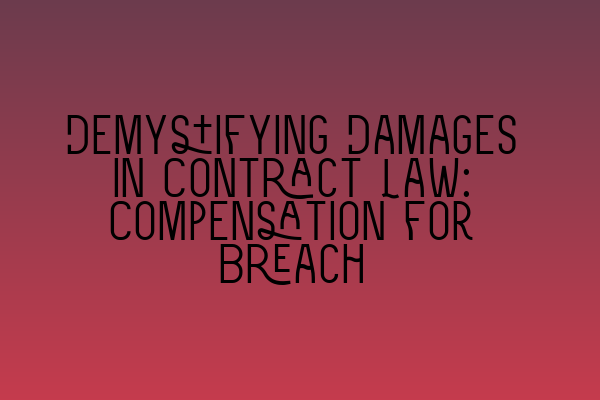Demystifying Damages in Contract Law: Compensation for Breach
“Damages in contract law serve as a means to compensate the innocent party for the losses suffered due to a breach of contract. Understanding the intricacies of damages is crucial to ensure fair compensation and uphold the principles of contract law. In this article, we will demystify damages in contract law and shed light on the different types of damages available, their calculation, and the factors considered by courts in awarding damages.”
Introduction
Contract law is the backbone of modern business transactions. It is essential for parties to have confidence in their agreements and the remedies available to them in case of a breach. Damages, as a form of remedy, aim to place the innocent party in the position they would have been in had the contract been performed. While damages seem like a straightforward concept, the calculation and types of damages can vary depending on the circumstances. It is vital to understand the nuances of damages to ensure fair compensation.
Types of Damages
In contract law, there are several types of damages that can be awarded for a breach of contract. The most common types include:
1. Compensatory Damages: Compensatory damages, also known as actual damages, are intended to compensate the innocent party for the actual losses suffered as a result of the breach. These damages aim to restore the injured party to the position they would have been in if the contract had been performed as agreed.
2. Consequential Damages: Consequential damages are those that arise as a result of the breach and were reasonably foreseeable by the breaching party at the time the contract was formed. These damages go beyond the direct losses and include any resulting damages that flow from the breach.
3. Nominal Damages: Nominal damages are symbolic in nature and are awarded when there is a breach of contract, but no actual losses have been suffered by the innocent party. These damages are often a small amount, usually a token gesture to acknowledge the breach.
4. Liquidated Damages: Liquidated damages are pre-determined amounts specified in the contract itself. Parties may agree on a specific sum to be paid in the event of a breach. These damages are typically used when the actual losses are difficult to calculate at the time of contract formation.
5. Punitive Damages: Punitive damages are rarely awarded in contract law and are reserved for cases involving willful misconduct or gross negligence. Their purpose is to punish the breaching party and deter them and others from similar conduct.
Calculation of Damages
The calculation of damages in contract law can be complex and is determined on a case-by-case basis. Courts aim to place the innocent party in the position they would have been in had the contract been performed. The factors considered in the calculation include:
1. Direct Losses: Direct losses refer to the actual financial losses suffered by the innocent party due to the breach. This includes any out-of-pocket expenses incurred, loss of profits, and other tangible financial impacts.
2. Reasonable Foreseeability: The breaching party is only liable for damages that were reasonably foreseeable at the time of contract formation. If the damages were not reasonably foreseeable, they may not be recoverable.
3. Mitigation: The innocent party has an obligation to mitigate their losses. This means taking reasonable steps to minimize the damages suffered as a result of the breach.
4. Certainty: Damages must be reasonably certain and not speculative. The innocent party must provide evidence to support the claimed amount of damages.
5. Causation: There must be a direct causal link between the breach and the losses suffered. The innocent party must prove that the breach was the cause of their damages.
The Role of Courts
Courts play a vital role in awarding damages in contract law. When calculating and awarding damages, courts consider various factors, including:
1. The terms of the contract and the nature of the breach.
2. The actual losses suffered by the innocent party.
3. Any attempts made by the innocent party to mitigate their losses.
4. The parties’ conduct leading to the breach.
5. The foreseeability of the damages at the time of contract formation.
It is important to consult with a knowledgeable contract law solicitor to navigate the complexities of damages and ensure the best possible outcome.
Conclusion
Understanding damages in contract law is crucial for both individuals and businesses. The availability and calculation of damages can significantly impact the outcome of a breach of contract case. By demystifying damages, we hope to empower individuals and businesses to seek fair compensation and uphold the principles of contract law.
For more legal insights, we invite you to explore these related articles:
– Exploring the Impact of Frustration on Contractual Obligations: Legal Insights
– Interpreting Contractual Clauses: Unlocking the Hidden Meanings
– Legal Aspects of Business Contracts: Key Considerations for Entrepreneurs
– Agreements in Contract Law: Understanding Its Various Types
– Essentials of Consideration: Understanding the Basis of Contractual Exchange
Remember, having expert legal advice is crucial when dealing with contract law matters. Contact SQE Contract Law for professional assistance and guidance.
Disclaimer: This article is for informational purposes only and is not intended as legal advice. For legal advice regarding your specific situation, please consult with a qualified solicitor.
